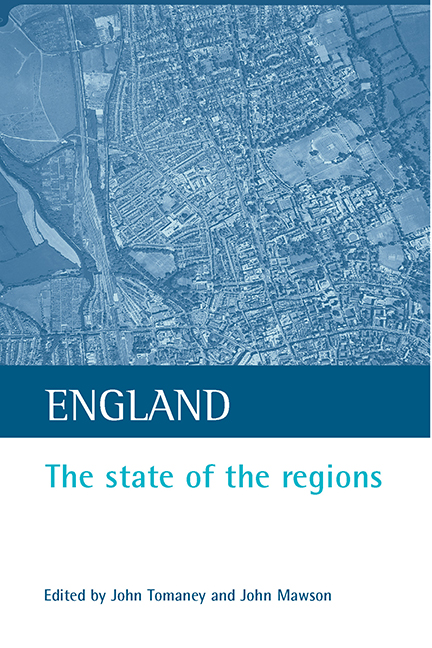Book contents
- Frontmatter
- Contents
- List of tables and figures
- Acknowledgements
- List of contributors
- one Introduction
- two Regional government in England: reviewing the evidence base
- three New Labour and the evolution of regionalism in England
- four Yorkshire (and the Humber)
- five Institutional collaboration in the West Midlands region
- six England's North West
- seven The South West
- eight Regionalism in the East of England
- nine The South East region?
- ten Regionalism in North East England
- eleven Regional strategy development in the East Midlands
- twelve The problem of regional governance
- thirteen Elected regional government: the issues
- fourteen Barnett plus needs: the regional spending challenge in Britain
- fifteen Conclusion: prospects for regionalism
- Index
- Also available from The Policy Press
nine - The South East region?
Published online by Cambridge University Press: 20 January 2022
- Frontmatter
- Contents
- List of tables and figures
- Acknowledgements
- List of contributors
- one Introduction
- two Regional government in England: reviewing the evidence base
- three New Labour and the evolution of regionalism in England
- four Yorkshire (and the Humber)
- five Institutional collaboration in the West Midlands region
- six England's North West
- seven The South West
- eight Regionalism in the East of England
- nine The South East region?
- ten Regionalism in North East England
- eleven Regional strategy development in the East Midlands
- twelve The problem of regional governance
- thirteen Elected regional government: the issues
- fourteen Barnett plus needs: the regional spending challenge in Britain
- fifteen Conclusion: prospects for regionalism
- Index
- Also available from The Policy Press
Summary
The South East of England is the region that no one seems to love. Central government civil servants created its boundaries to ensure there was a region in the parts of England which lie outside London, south of the Midlands and before the ‘west country’ begins. It serves to complete the map rather than act as an equivalent entity to regions like the North East. Moreover, it is easy to invoke some fairly straightforward stereotypes which seem to confirm the South East's ‘peripheral’ status within the regional project, something shared by the current government which sees regional government emerging first in the north of England.
The elements to the story of the South East are:
• the absence of a campaign for the region, indicating minimal elite and organisational mobilisation;
• the low level of support among the public for regional reforms – 58% disagree with the statement: ‘regional politicians would be more trustworthy than members of parliament’ (cited in Harding, 2000, pp 32-3);
• fragmentation into competing subregions, which stymies attempts to build regional-level partnerships;
• the high level of prosperity, which limits interest in institutions that have their prime role in economic development.
The previous dominance of the South East by the Conservative Party has imprinted free market ideas on the mindset of political elites and the general public, predisposing them against regional government and regional coordination and policy making. The pre-existence of the networks and partnerships, which extend outside the region to other regions and countries, suggests the region has no cohesiveness (John, 1997). The lack of a centre or even a large ‘capital city’ does not offer a focus for political leadership, since most cities in the region have less than 100,000 inhabitants. Attractive as Guildford may be, it lacks something of the sweep and verve needed in a regional capital, which could compete with Bordeaux, Milan or Barcelona (although the lack of a dominant metropolitan centre could avoid the scenario of regional government becoming the project of its large city, such as Manchester in the North West and Birmingham in the West Midlands). Most of all, the existence of London as a region in its own right removes the natural centre of the South East in terms of its economy, polity and cultural life as it often has to feed through London to make sense of its problems and potentialities.
- Type
- Chapter
- Information
- EnglandThe State of the Regions, pp. 125 - 136Publisher: Bristol University PressPrint publication year: 2002



